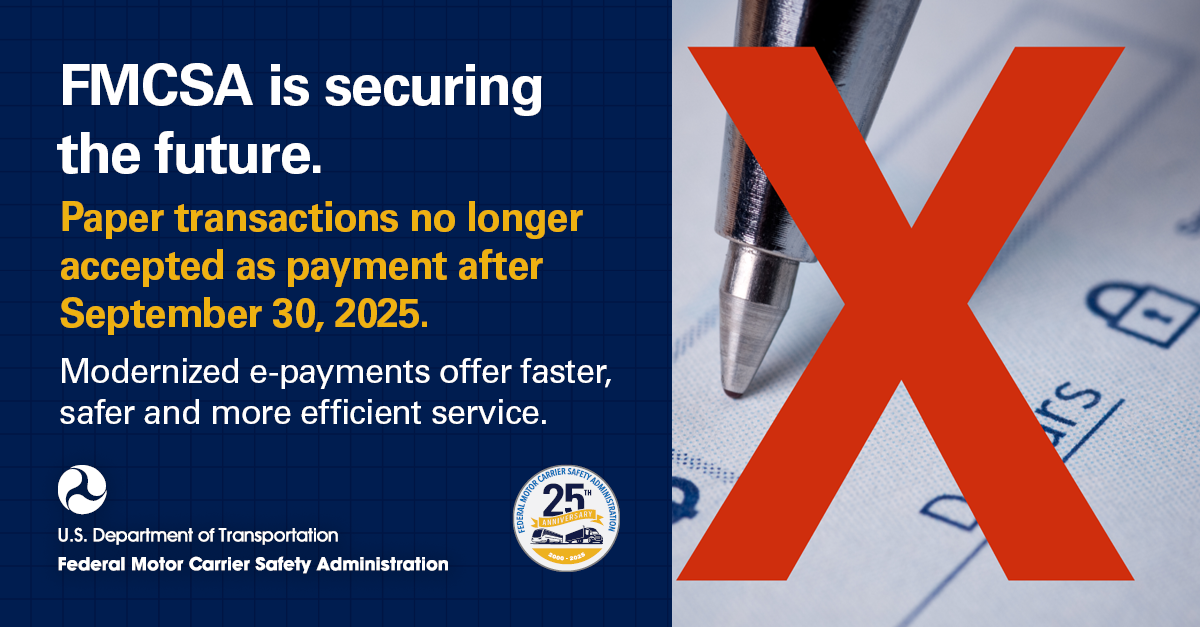FMCSA Just Pulled the Plug on Paper Checks — Here’s What That Really Means for Carriers
As of September 30, 2025, FMCSA officially shut the door on all paper-based payments. No more checks. No money orders. No cashier’s checks.
If you’re filing for authority, paying penalties, renewing UCR, or updating your DOT number — it’s digital or nothing.
This isn’t a suggestion. It’s a full-on cutoff.
Image from FMCSA
What’s Really Behind the Move
FMCSA says this is about efficiency, fraud prevention, and cutting delays. And they’re not wrong — paper payments were messy, slow, and prone to human error.
But make no mistake: this is also part of a bigger government play to modernize every compliance system. From IRS e-filings to Clearinghouse reports, federal agencies are phasing out anything that requires stamps or envelopes.
FMCSA, managing over 700,000 active carriers, has been drowning in paper for years. This move isn’t just cleanup — it’s control. It gives the agency real-time visibility into who’s paying, who’s not, and who’s falling behind.
Who’s About to Feel the Pain
If you’re running QuickBooks online and already paying everything with a company card, you’ll barely notice.
But small carriers — especially single-truck operations and immigrant-owned businesses — will feel the pinch first. Many still rely on handwritten checks and local accountants. For them, this change isn’t convenience — it’s disruption.
Picture this: a one-truck carrier mails a check for an authority reinstatement on September 29. FMCSA gets it a few days later, rejects it, and now that carrier’s operation sits idle for another week. That’s a week of lost freight, lost income, and unnecessary stress — all because of one outdated payment habit.
Here’s What You Need to Do Now
Don’t overthink it. Just get digital, fast:
Set up a dedicated business payment card — debit or credit — used only for FMCSA transactions.
Update your accounting system to record online payments cleanly (QuickBooks, Xero, or even a basic ledger works).
Train whoever handles filings — dispatchers, compliance partners, office admins — on the new online process.
Run a test payment before your next renewal or filing. Make sure it works.
Check your FMCSA portals regularly for updates or rejected transactions.
This isn’t optional. Any paper submission now bounces back — and every day of delay costs money.
The Bigger Picture
Let’s zoom out.
This isn’t just about how you pay. It’s about how FMCSA enforces. Paper was one of the last shields carriers had between compliance and full digital oversight. That wall just came down.
Next up? Expect more digital-first policies — from document uploads to automated safety scoring. The agency is tightening every system to make enforcement faster and paperless.
Bottom Line
Paper checks are dead in trucking compliance.
Carriers who adapt will move faster, cut headaches, and stay clear of audit triggers.
Those who don’t will face rejected filings, delayed authorities, and penalties that hit cash flow hard.
Takeaway
Don’t treat this as a payment update — treat it as a compliance wake-up call.
If your business still runs on paper, FMCSA just gave you a deadline to evolve.
Strategic Advice
Use this moment to audit everything.
If your filings, payments, or renewals still involve envelopes and signatures, digitize now. Because this won’t be the last thing FMCSA takes online — it’s just the first domino.

